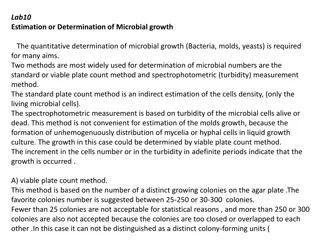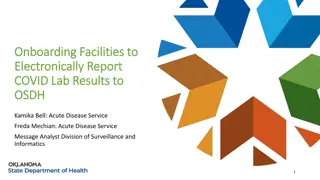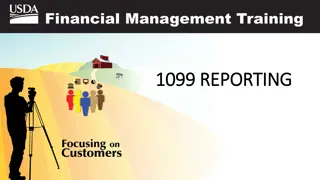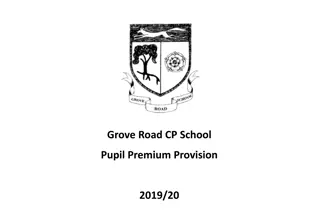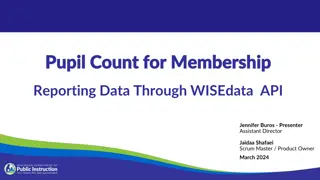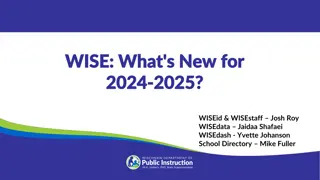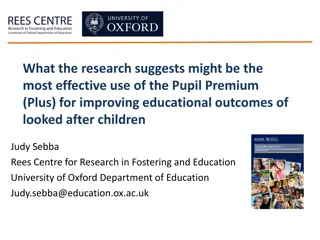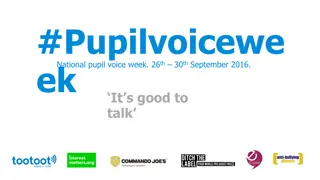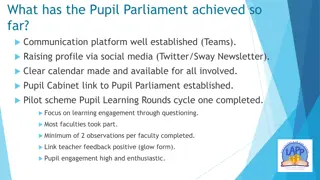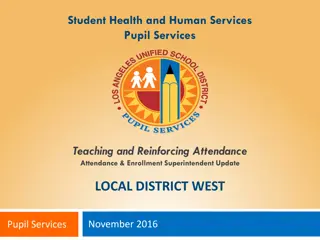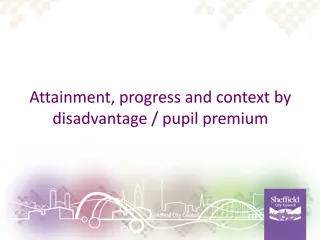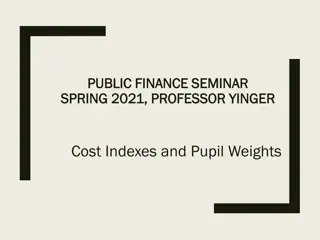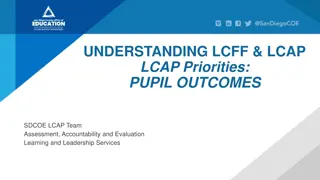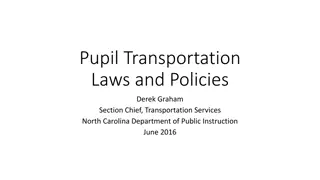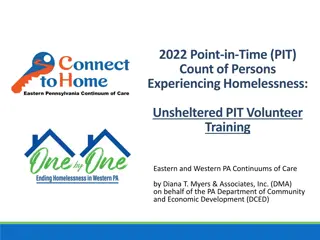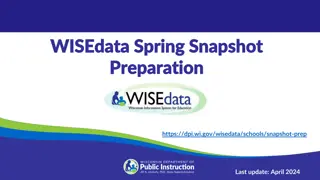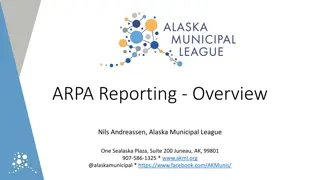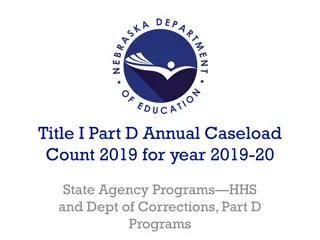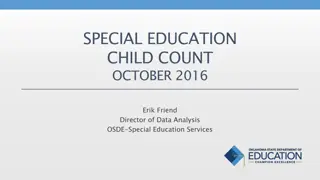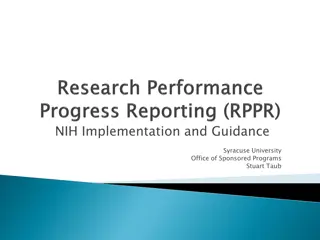Innovative Strategies for Effective Pupil Feedback at Cwmfelin Primary School
The National Professional Enquiry Project at Cwmfelin Primary School, led by Kyle Winter, explores alternative feedback strategies for meaningful pupil engagement and progression. Faced with limitations during the pandemic, the research focuses on qualitative data collection through student intervie
1 views • 19 slides
ECC Social Value Reporting and Evaluation Framework
Essex County Council (ECC) has implemented a robust Social Value Reporting and Evaluation framework based on the Local Government Association's National TOMs method. This framework categorizes and assesses social value contributions in two parts - Value Score and Supporting Statement Score - to deri
3 views • 16 slides
Understanding WBC Differential Count in Blood Analysis
WBC (white blood cell) count is essential in assessing a patient's health. A differential count helps determine the percentage of different types of white blood cells. This analysis can provide important insights into various health conditions like infections, allergies, and systemic illnesses. The
1 views • 9 slides
Methods for Determination of Microbial Growth
Quantitative determination of microbial growth is crucial for various purposes, with two commonly used methods being the standard plate count and spectrophotometric measurement. The standard plate count method estimates living microbial cell density, while spectrophotometric measurement relies on tu
2 views • 6 slides
Streamlining Electronic Reporting of COVID Lab Results to OSDH
This documentation outlines the process of electronically reporting COVID lab results to the Oklahoma State Department of Health (OSDH). It covers the purpose, available options, specifications, formats, and the onboarding and testing process, aiming to accelerate the reporting of healthcare facilit
0 views • 9 slides
Overview of 1099 Reporting Systems
The 1099 Reporting Systems consist of MINC, EARN, and SPPS, which are used for IRS 1099 reporting purposes. These systems handle transactions and generate Form 1099 for recipients based on predefined criteria. Taxpayers are responsible for accurate reporting to the IRS, with reporting thresholds set
0 views • 15 slides
Point-in-Time Count of Unsheltered Persons Experiencing Homelessness - Volunteer Training Overview
Point-in-Time Count (PIT) is crucial for understanding and addressing homelessness. This volunteer training provides insights into counting unsheltered individuals, gathering demographic data, and why PIT counts are conducted. It emphasizes the importance of measuring trends, strategizing resource a
1 views • 40 slides
UNEP Support for Improving UNCCD Reporting Procedures
UNEP has been providing support since 2010 to enhance the reporting processes of the UNCCD, focusing on streamlined funding approaches, technical assistance, and capacity building. Key outcomes include the development of reporting tools, online reporting systems, and building credible data from coun
0 views • 14 slides
Grove Road CP School Pupil Premium Provision 2019/20 Overview
The Grove Road CP School Pupil Premium Provision for 2019/20 focuses on targeting extra funds to disadvantaged pupils to support them in reaching their full potential. With an aim to close the attainment gap, the school offers various activities and programs funded by the grant. These include academ
0 views • 8 slides
Impact of National Funding Formula on Schools in Bath & North East Somerset
The National Funding Formula Stage 2 aims to enhance educational opportunities in Bath & North East Somerset. It addresses factors like per-pupil funding, English as an additional language, low prior attainment, deprivation, and additional needs. Allocations detail funding based on pupil categories
3 views • 9 slides
Climate Change Monitoring, Reporting, and Verification (MRV) Training Session Overview
This document outlines the purpose and reporting requirements for the development of a Climate Change Monitoring, Reporting, and Verification (MRV) system, focusing on projections and scenarios. It highlights the importance of collecting information for climate mitigation, assisting Serbia in meetin
0 views • 19 slides
Comprehensive Overview of Pupil Count Reporting in WISEdata API
This presentation covers the reporting requirements for pupil count membership data through the WISEdata API, including agenda details, an extended timeline, reasons for the pilot project, and insights into how the Pupil Count Module in WiSFiP works. It also discusses the reporting needs for 2024, t
3 views • 31 slides
Transitioning to Incident-Based Crime Reporting: Enhancing Transparency and Accountability
Anytown Police Department (APD) is leading the transition from Summary Reporting to Incident-Based Reporting through the National Incident-Based Reporting System (NIBRS). This change promotes transparency, provides detailed crime data to the public, and improves statewide and national crime statisti
3 views • 17 slides
Insights into Structured Reporting Practices in Colorectal Cancer Imaging
A survey conducted by Dr. Eric Loveday at North Bristol NHS Trust revealed the current landscape of structured reporting in MRI and CT scans for rectal and colon cancer. Results indicate a positive outlook towards implementing national standards for structured radiology reporting, with an emphasis o
0 views • 7 slides
What's New for WISE 2024-2025
WISE is introducing various enhancements and updates for the academic years 2024-2025 and 2025-2026. Key improvements include WISEid integration for staff identity, data quality dashboard enhancements, dual reporting in 24/25 SY, and pupil count reporting. These advancements aim to streamline proces
0 views • 32 slides
Improving Educational Outcomes of Looked After Children: Effective Use of Pupil Premium
Research from the Rees Centre at the University of Oxford highlights the challenges faced by looked after children in England and the importance of using Pupil Premium effectively to enhance their educational outcomes. With a focus on identifying effective strategies and involving various stakeholde
0 views • 20 slides
Dame Elizabeth Cadbury School Pupil Pledge Program
Dive into the engaging Pupil Pledge Program at Dame Elizabeth Cadbury School, designed to empower students to enhance their skills and experiences. Students across different year groups undertake an array of tasks, from exploring new activities to contributing to the community, in their journey towa
0 views • 21 slides
Pupil-Led Approaches for Understanding and Resolving School Bullying
Explore how Dr. Elizabeth Nassem's Bullied Voices initiative utilizes pupil-led strategies to tackle school bullying. The approach focuses on understanding individual experiences, involving children directly, and tailoring interventions based on specific needs. By drawing upon the voices of pupils a
0 views • 15 slides
Implementation of Pupil Equity Funding at Lundavra Primary
Lundavra Primary in Fort William, opened in 2015, amalgamated from three schools, serves a diverse student population with 15% on free school meals and 19% living in SIMD 2 areas. The implementation process involves identifying gaps through data tracking, analyzing pupil equity data, and addressing
0 views • 15 slides
National Pupil Voice Week - Empowering Young Voices Against Bullying
Pupil Voice Week advocates for empowering pupils to speak up against issues like bullying, cyberbullying, and self-harm. Through partnerships with various organizations, the event aims to provide resources and support for students to address their concerns confidently. It sheds light on alarming sta
0 views • 12 slides
Achievements and Next Steps of Pupil Parliament
Pupil Parliament has made significant progress in establishing communication channels, utilizing social media, implementing learning rounds, and enhancing student engagement through questioning. Moving forward, their focus is on enhancing wider skills, fostering a culture of questioning, and incorpo
0 views • 4 slides
Understanding Student Attendance Goals and Strategies in Pupil Services
This content delves into the goals and strategies for maintaining student attendance in Pupil Services within the Local District West. It outlines the objectives, attendance data overview, and the importance of meeting attendance goals, particularly in the context of the LCAP objectives for the 2016
0 views • 42 slides
Improving Attainment and Progress of Disadvantaged Pupils in Sheffield
Attainment and progress of disadvantaged pupils in Sheffield show an improving trend across key stages, although the gaps between disadvantaged and non-disadvantaged students are not closing fast enough. Data suggests that disadvantaged pupils with low prior attainment are making better progress in
0 views • 29 slides
Cost Indexes and Pupil Weights in Public Finance Seminar
Explore the importance of cost indexes and pupil weights in public finance, focusing on expenditure needs, cost disparaties, and aid programs. Key concepts like expenditure need, cost index, and pupil weight are discussed along with the cost function and expenditure requirements to meet performance
0 views • 32 slides
Effective Use of Pupil Premium for Closing Achievement Gaps
Addressing the effective utilization of pupil premium to enhance academic achievement and bridge disparities, the content highlights strategies, statistics, and key findings regarding the impact on both highly able and disadvantaged students. Insights from Sir John Dunford's keynote speech at the Au
0 views • 49 slides
Understanding LCFF and LCAP Priorities for Pupil Outcomes
The Local Control Funding Formula (LCFF) and Local Control and Accountability Plan (LCAP) are crucial in addressing the needs of all students in school districts. The LCAP must focus on eight state priorities, including basic services, academic standards implementation, parental involvement, and pup
0 views • 6 slides
Overview of Pupil Transportation Laws and Policies in North Carolina
Explore the comprehensive guide to pupil transportation laws and policies in North Carolina. Topics covered include state public school law, authority of local boards of education, duties of the State Board, guidelines for routing, assignment of school buses, and use and operation of school buses. G
0 views • 63 slides
Simpler Systems Reporting Pilot for Financial Data Enhancement
The Simpler Systems Reporting Pilot is underway to enhance financial data reporting at the university campus. Led by Vice President Ryan Nesbit's team, this initiative aims to improve University-wide financial reporting mechanisms and accessibility to data through the Simpler tool. The pilot include
0 views • 5 slides
Understanding the 2022 Point-in-Time (PIT) Count of Persons Experiencing Homelessness
Learn about the significance of the annual Point-in-Time Count (PIT) conducted to measure homelessness trends, the distinction between sheltered and unsheltered counts, the guiding principles of the count, its purpose, and the specific locations where unsheltered individuals may be found. Explore wh
0 views • 44 slides
Overview of WISEdata Snapshot Preparation and Reporting Requirements
The WISEdata Snapshot Preparation provides crucial details on data entry, validation, and reporting processes for educational institutions. It outlines the importance of accurate data collection for federal reporting, public reporting, and funding determinations. Additionally, the Snapshot Reporting
0 views • 41 slides
Ensuring Chemical Reporting and Preparedness at the DEQ
The Chemical Reporting and Preparedness section at the DEQ focuses on regulations under EPCRA, prompted by incidents like the Bhopal tragedy. EPCRA covers Tier II reporting, spill reporting, LEPCs, State Emergency Response Commission, and Oklahoma Hazardous Materials Emergency Response Commission. T
0 views • 17 slides
ARPA Reporting Overview and SLFRF Guidelines in Alaska
This document outlines the reporting overview for the ARPA (American Rescue Plan Act) and specific guidelines for the Coronavirus State and Local Fiscal Recovery Fund (SLFRF) in Alaska. It covers acceptance, use, and reporting of funds, as well as designating staff roles for managing reports. The co
3 views • 22 slides
Buckinghamshire Claimant Count Analysis March 2023
This report provides insights into the Claimant Count and Alternative Claimant Count in Buckinghamshire for March 2023. The data reveals an increase in the number of residents claiming out-of-work related benefits compared to previous months, with detailed breakdowns by parliamentary constituencies.
0 views • 15 slides
Feedback Analysis on Medication Incident Reporting in Hospitals
Feedback received from IMSN members on NIMS and incident reporting revealed various issues affecting the rates at which staff report medication incidents/near misses within hospitals. Major themes included staffing numbers and turnover, pharmacist involvement in incident reporting, clinical pharmacy
0 views • 12 slides
State Agency Annual Caseload Count Process for Title I Part D Programs
State agencies participate in an annual caseload count process for Title I Part D programs to determine funding allocations. The process involves a one-day count of students in HHS and Dept. of Corrections programs, with specific guidelines for data collection and reporting.
0 views • 9 slides
Overview of Special Education Child Count October 2016
Introduction to the Special Education Child Count process conducted annually in October, collecting data for state and federal reporting purposes, impacting funding allocations based on the count. The data review process, including checks for ensuring quality data, eligibility documentation, IEP fin
0 views • 12 slides
Importance of Wildland Fire Reporting to the Fire Community
Wildland fire reporting plays a critical role in providing accurate data for effective fire management. Defined state fires and challenges in reporting impact funding, risk management, and agency support. Comprehensive reporting like the Wildland Fire Occurrence Reporting for Massachusetts is essent
0 views • 6 slides
Streamlining Research Progress Reporting for NIH Awards
Research Performance Progress Report (RPPR) is a standardized mechanism to facilitate interim progress reporting for NIH-funded projects, aiming to enhance consistency and minimize administrative burdens. It replaces the eSNAP process for certain types of awards and fellowship grants. RPPR includes
0 views • 12 slides
Understanding the Interpretation of Model Summary Numbers in Pupil Dilation Growth Curve Analysis
When analyzing a growth curve model for pupil dilation, the model summary provides various numbers such as Intercepts, Poly1, Poly2, Condition effects, and interaction terms. Understanding these numbers is crucial for interpreting how pupil dilation is predicted by time and affected by experimental
0 views • 34 slides
Understanding Complete Blood Count (CBC) Testing
Complete Blood Count (CBC) is a crucial test that provides information about the composition of a patient's blood, including red blood cells, white blood cells, and platelets. This test helps in diagnosing conditions such as anemia, infections, and more. CBC involves analyzing parameters like RBC co
0 views • 20 slides



